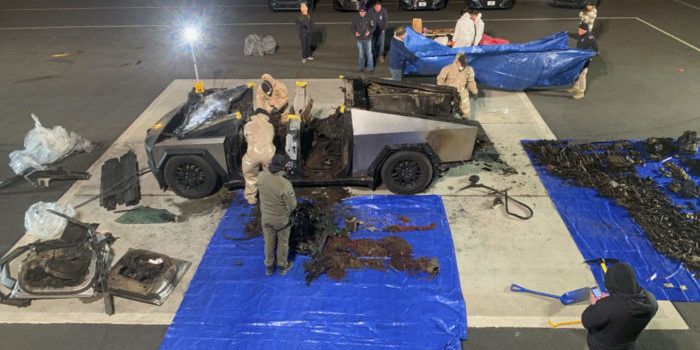(Headline USA) The highly decorated soldier who exploded a Tesla Cybertruck outside the Trump hotel in Las Vegas used generative artificial intelligence including ChatGPT to help plan the attack, Las Vegas police said Tuesday.
A laptop, cellphone and watch are still under review nearly a week after 37-year-old Matthew Livelsberger reportedly shot himself just before the truck blew up.
However, online theories have emerged suggesting that Livelsberger may have been a whistleblower ready to expose either U.S. military operations in the Middle East or else a cover-up of its secretive drone test flights.
Those theories rest on the possibility that he was shot sometime prior to the rented Cybertruck’s suicide mission and that its self-driving feature may have been deployed to pilot the vehicle to its destination.
His familiarity with the cutting-edge AI technology will likely bolster skepticism among those who argue that elements of the story do not logically compute.
Among those are the fact that the Trump-supporting Green Beret would have targeted the president-elect’s hotel and that identifying documents including his passport happened to survive the conflagration that charred the body inside beyond recognition.
Military experts further maintain that Livelsberger’s training would have given him the know-how to execute a much more deadly and sophisticated attack.
The explosion caused minor injuries to seven people but virtually no damage to the Trump International Hotel.
Authorities maintain that Livelsberger acted alone.
The new developments also follow suspicions that the Vegas attack may have been linked with an early-morning terror attack in New Orleans due to what investigators insist were a series of remarkable coincidences.
Both of the now-deceased suspects were Army servicemen who had been stationed at North Carolina’s Fort Bragg and had done tours in Afghanistan. Both also used the little-known app Turo to rent electric vehicles that were used in the carefully planned attacks.
Shamsud Din Jabbar, the driver who fatally plowed down 14 revelers on Bourbon Street before engaging New Orleans police in a shootout, had been on at least two prior planning expeditions, during which he used Meta Glasses to record and surveille the layout of the French Quarter.
An investigation of Livelsberger’s searches through ChatGPT indicated he was looking for information on explosive targets, the speed at which certain rounds of ammunition would travel and whether fireworks were legal in Arizona.
Kevin McMahill, sheriff of the Las Vegas Metropolitan Police Department, called the use of generative AI a “game-changer” and said the department was sharing information with other law-enforcement agencies.
“This is the first incident that I’m aware of on U.S. soil where ChatGPT is utilized to help an individual build a particular device,” he said. “It’s a concerning moment.”
Ironically, billionaire Elon Musk, a key supporter and adviser to President-elect Donald Trump, was instrumental in the development of both the Cybertruck and ChatGPT—whose parent company, OpenAI, Musk helped found before an acrimonious split.
During a roughly half-hour-long news conference, Las Vegas police and federal law enforcement officials unveiled new details about the New Year’s Day explosion.
Among the details law enforcement disclosed: Livelsberger stopped during the drive to Las Vegas to pour racing-grade fuel into the Cybertruck, which then dripped the substance.
The vehicle was loaded with 60 pounds of pyrotechnic material. Officials are still uncertain exactly what detonated the explosion, but they said it could have been the flash from the firearm that Livelsberger used to fatally shoot himself.
Livelsberger, who was living in Colorado Springs, Colorado, left notes saying the explosion was a stunt meant to be a “wake up call ” for the nation’s troubles, officials said last week.
He left cellphone notes saying he needed to “cleanse” his mind “of the brothers I’ve lost and relieve myself of the burden of the lives I took.”
Livelsberger’s letters touched on political grievances, societal problems and domestic and international issues, including the war in Ukraine.
He wrote that the U.S. was “terminally ill and headed toward collapse.”
Investigators had been trying to determine if Livelsberger wanted to make a political point, given the Tesla and the hotel bearing the president-elect’s name.
Livelsberger harbored no ill will toward Trump, law enforcement officials said. In one of the notes he left, he said the country needed to “rally around” him and Musk.
Adapted from reporting by the Associated Press

